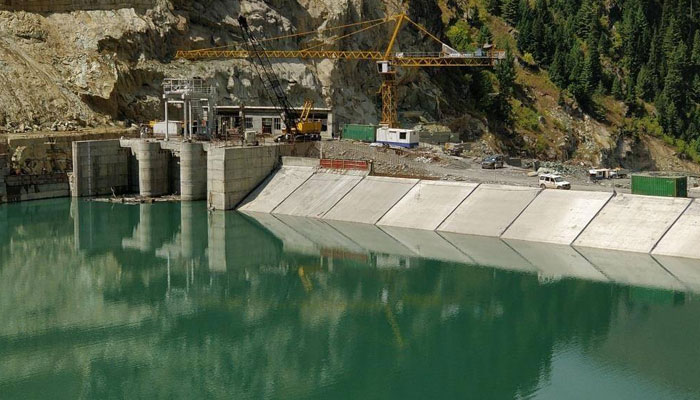Indus Waters Treaty can’t be modified unilaterally: Pakistan
The Attorney-General’s Office took notice of news stories appearing in the Indian press regarding India’s attempt at unilateral modification of the Indus Waters Treaty
ISLAMABAD: The Attorney-General’s Office Friday took notice of news stories appearing in the Indian press regarding India’s attempt at unilateral modification of the Indus Waters Treaty.
In a statement issued here, the AG’s Office termed such stories “misleading,” adding that the Treaty cannot be unilaterally modified.
“This is an attempt to divert attention from the ongoing proceedings at the Permanent Court of Arbitration under the Indus Waters Treaty,” says the statement.
It stated that the first hearing in a dispute between Pakistan and India over the Indus Waters Treaty began on Friday at the Permanent Court of Arbitration in The Hague, the Netherlands.
It stated that the dispute pertains to concerns raised by Pakistan over India’s construction of the 330 MW Kishenganga hydroelectric project on the River Jhelum and plans to construct the 850 MW Ratle hydroelectric project on the River Chenab in the Indian-occupied territory of Jammu and Kashmir.
It stated that Pakistan’s decision to initiate proceedings was in response to India’s persistent refusal to address Pakistan’s concerns, adding that the Treaty provides for two forums for the settlement of disputes: “Pakistan is engaging with both sides,” the statement says. “However, in contrast, and characteristic bad faith, India has boycotted the Court of Arbitration, and the Court is competent to proceed ex parte and is doing so,” says the statement.
Meanwhile, the Foreign Office spokesperson said: “As we speak, a Court of Arbitration is holding its first hearing in The Hague on Pakistan’s objections to Kishanganga and Ratle Hydroelectric Projects. The Court of Arbitration has been set up under the relevant provisions of the Indus Waters Treaty. Such media reports should not divert attention from the important proceedings of the Court of Arbitration.”
-
 'Too Hard To Be Without’: Woman Testifies Against Instagram And YouTube
'Too Hard To Be Without’: Woman Testifies Against Instagram And YouTube -
 Kendall Jenner Recalls Being ‘too Stressed’: 'I Want To Focus On Myself'
Kendall Jenner Recalls Being ‘too Stressed’: 'I Want To Focus On Myself' -
 Dolly Parton Achieves Major Milestone For Children's Health Advocacy
Dolly Parton Achieves Major Milestone For Children's Health Advocacy -
 Oilers Vs Kings: Darcy Kuemper Pulled After Allowing Four Goals In Second Period
Oilers Vs Kings: Darcy Kuemper Pulled After Allowing Four Goals In Second Period -
 Calgary Weather Warning As 30cm Snow And 130 Km/h Winds Expected
Calgary Weather Warning As 30cm Snow And 130 Km/h Winds Expected -
 Maura Higgins Reveals Why She Wears Wigs On 'The Traitors' And What Her Real Hair Is Like
Maura Higgins Reveals Why She Wears Wigs On 'The Traitors' And What Her Real Hair Is Like -
 Brandi Glanville Reveals Shocking Link Of Facial Issues To Leaking Implants, Claims 'no' Support From Ex Eddie Cibrian
Brandi Glanville Reveals Shocking Link Of Facial Issues To Leaking Implants, Claims 'no' Support From Ex Eddie Cibrian -
 Who Is Rob Rausch’s Girlfriend? 'The Traitors' Winner Linked To Kansas City Woman
Who Is Rob Rausch’s Girlfriend? 'The Traitors' Winner Linked To Kansas City Woman -
 Bobby J. Brown, 'Law & Order' And 'The Wire' Actor, Dies At 62
Bobby J. Brown, 'Law & Order' And 'The Wire' Actor, Dies At 62 -
 Netflix Gives In As Paramount Offers Massive Breakup Fee To Step Away From Warner Bros. Discovery Bid
Netflix Gives In As Paramount Offers Massive Breakup Fee To Step Away From Warner Bros. Discovery Bid -
 Who Won 'Traitors' Season 4? Rob Rausch Claims $220,800 Grand Prize
Who Won 'Traitors' Season 4? Rob Rausch Claims $220,800 Grand Prize -
 Niall Horan Shares Update On New Music On The Way
Niall Horan Shares Update On New Music On The Way -
 Backstreet Boys Member Brian Littrell Refiles Trespassing Lawsuit Against Florida Retiree
Backstreet Boys Member Brian Littrell Refiles Trespassing Lawsuit Against Florida Retiree -
 Kate Middleton Dubbed ‘conscious Shopper’ By Famous Fashion Expert
Kate Middleton Dubbed ‘conscious Shopper’ By Famous Fashion Expert -
 Princess Catherine Joins Volunteers In Newtown During Powys Visit
Princess Catherine Joins Volunteers In Newtown During Powys Visit -
 Shamed Andrew Thought BBC Interview Was ‘time To Shine,’ Says Staff
Shamed Andrew Thought BBC Interview Was ‘time To Shine,’ Says Staff




